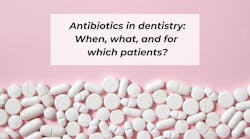New antibiotic represents potential breakthrough in managing dental diseases
The problem with Gram-negative bacteria
Gram-negative bacteria create a slew of challenges for oral health. They’re major contributors to periodontal disease, oral infections, and abscesses. Every clinician knows the struggle of trying to resolve these infections, especially when it comes to periodontitis.
Taking antibiotics is a standard treatment for common infections, but killing Gram-negative bacteria poses a complicated challenge. They are often resistant to multiple antibiotics due to their steadfast ability to develop resistance.
Broad-spectrum antibiotics that are effective against Gram-negative bacteria destroy gut microflora.1 This can lead to increased susceptibility to secondary infections, such as C. difficile, which can be life-threatening or severely impair quality of life.2
While many Gram-negative antibiotics have been developed over the past 10 years, unfortunately, the FDA hasn’t approved any of them.1 In a study recently published in the journal Nature, we get a glimpse of a newly-developed Gram-negative antibiotic, lolamicin, that spares essential gut bacteria. Here’s what this could mean for dentistry.
What is lolamicin?
Gram-negative bacteria can cause life-threatening diseases such as sepsis, salmonella, and even cholera. It has incredibly durable barriers that prevent antibiotics from penetrating and terminating the cells.1 This makes it especially dangerous.
Small-scale, preliminary tests have been done to find a way to effectively wipe out this bacterium. Scientists have experimented with compounds that inhibit the ‘Lol system’, which is a collection of proteins exclusively found in Gram-negative bacteria.
A compound called lolamicin was found to “selectively kills pathogenic bacteria over non-pathogenic bacteria based on differences in Lol proteins between these bacteria”, according to Paul Hergenrother, a chemist at the University of Illinois at Urbana-Champaign. It is effective against over 130 multidrug-resistant strains and can kill bacteria without disrupting the gut microbiome.2
Although current research has only been conducted on mice, this is promising news.1 Mice tested with blood stream infections with antibiotic-resistant bacteria all survived after being exposed to lolamicin. For comparison, 87% of those that didn’t receive the compound died within three days.1
How does this relate to dentistry?
Antibiotic premedication and stewardship
As awareness of antibiotic stewardship has grown, so has the controversy and confusion around antibiotic premedication. Recent research and updated guidelines have reflected the fact that premedication often does more harm than good. For patients that truly do need premedication, more tailored antibiotic options would be highly beneficial.
Under new guidelines from the ADA, routine antibiotic use is not recommended for patients with pulpal- and periapical-related pain.3 However, when antibiotic treatment is truly needed, lowering the chances of developing an infection such as C. diff is very advantageous.
Treatment of periodontal disease
Because bacteria associated with periodontal diseases are predominantly Gram-negative,4 treatment can be very difficult. Having a new Gram-negative antibiotic, particularly one that could be locally delivered, would be a huge benefit to patients.
Scientists must continue researching the potentially life-saving effects of this compound to determine if it is safe for human consumption — and if Gram-negative bacteria will eventually develop a resistance.
Our sister publications Dental Economics and RDH have published extensively on antibiotic issues in dentistry. Check out some of our best articles:
Antibiotics, dental procedures, and prosthetic joints: Time to look at the evidence
Antibiotics in dentistry: Think twice before prescribing
Untangling current recommendations on antibiotic premedication
To receive further updates about antibiotics in dentistry, make sure you’re subscribed to our newsletters.
References
- Schwaller F. ‘Smart’ antibiotic can kill deadly bacteria while sparing the microbiome. May 29, 2024. Nature. https://www.nature.com/articles/d41586-024-01566-8
- Muñoz, KA, Ulrich, RJ, Vasan, AK, et al. A Gram-negative-selective antibiotic that spares the gut microbiome. Nature. May 29, 2024. https://doi.org/10.1038/s41586-024-07502-0
-
American Dental Association. Antibiotic stewardship. Updated April 5, 2023. https://www.ada.org/en/resources/ada-library/oral-health-topics/antibiotic-stewardship
-
Abdulkareem AA, Al-Taweel FB, Al-Sharqi A J.B., Gul SS, Sha A, Chapple I L.C. Current concepts in the pathogenesis of periodontitis: from symbiosis to dysbiosis. J Oral Microbiol. 2023; 15(1): 2197779. doi: 10.1080/20002297.2023.2197779









